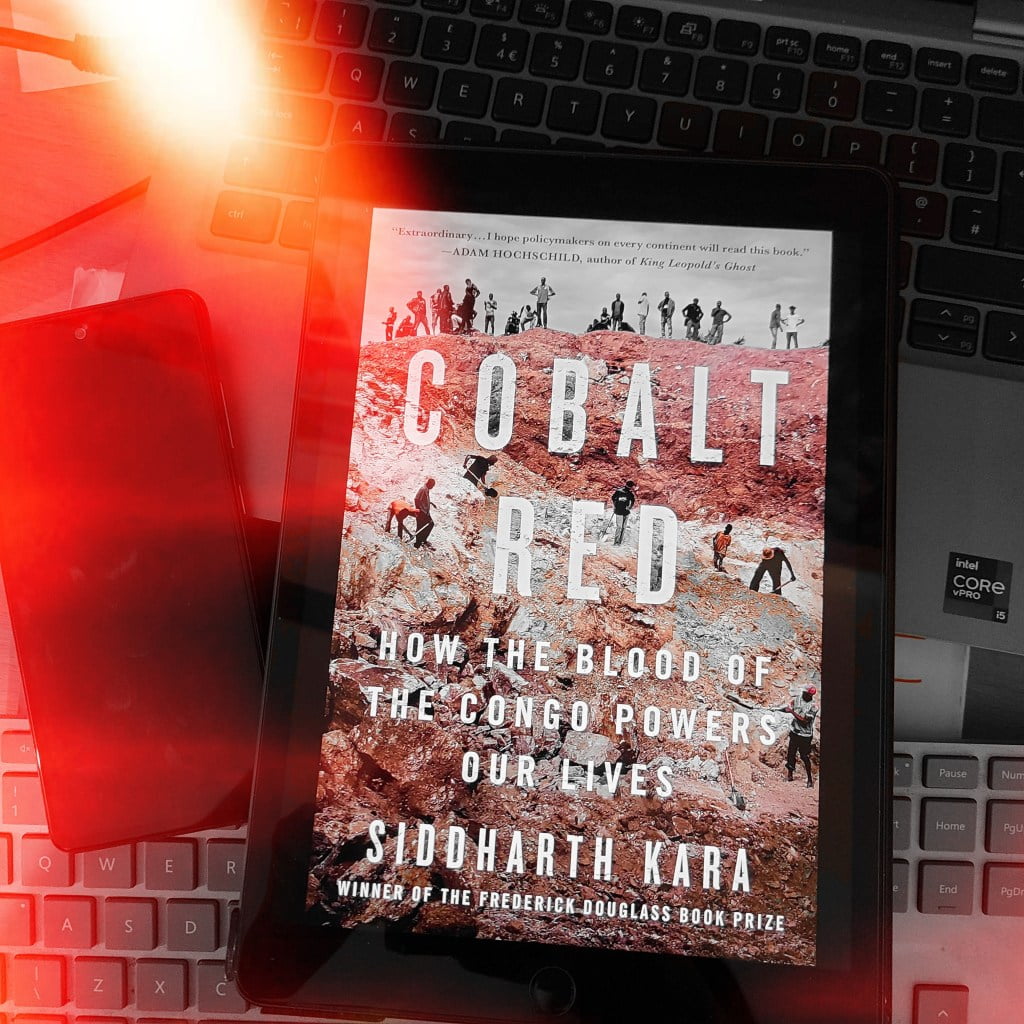
Cobalt Red: How The Blood of the Congo Powers Our Lives is a powerful and important book that exposes the human rights abuses and sheds light on the dark side of the global cobalt industry. Siddharth Kara, an award-winning investigative journalist, travelled deep into cobalt territory to document the testimonies of the people living, working, and dying for cobalt.
The book delves deep into the lives of cobalt miners and their families in the Democratic Republic of Congo (DRC), who work in unsafe and inhumane conditions to extract the mineral that powers our smartphones, laptops, and electric vehicles.
“The land was a hellscape of craters and tunnels, patrolled by maniacs with guns.”
Siddharth kara, Cobalt Red
Why is Cobalt important?
Cobalt is a mineral that is used in a variety of products, including smartphones, laptops, and electric cars. In this case, the Democratic Republic of the Congo (DRC) is the world’s largest producer of cobalt, and the vast majority of the cobalt that is mined in the DRC is done so by hand in artisanal mines. These mines are often dangerous and unregulated, and children as young as six are often forced to work in them.
In a damning statement, Kara says: “This was the final truth of cobalt mining in the Congo: the life of a child buried alive while digging for cobalt counted for nothing. All the dead here counted for nothing. The loot is all.”
Who is the author Siddharth Kara?

Siddharth Kara is an author, speaker, and leading expert on modern-day slavery and human trafficking. He is a senior fellow at the Harvard Kennedy School of Government's Carr Center for Human Rights Policy, where he focuses on issues related to human trafficking, forced labor, and the effectiveness of anti-trafficking policies. Kara has written several books on the subject, including "Sex Trafficking: Inside the Business of Modern Slavery," which has become a seminal work on the subject. He has also advised the United Nations, the U.S. Government, and other organisations on anti-trafficking policies and practices.
As a result, Kara provides a detailed account of the history of the cobalt industry in the DRC and the various stakeholders involved in its supply chain. He highlights the exploitation and abuse faced by the miners and the severe impact on their health, safety, and human rights. He also reveals corruption, greed, and lack of accountability of the industry players and the government.
The book is a sobering reminder of the human cost of our consumption, and it calls for us to take action to ensure that the minerals that we use are not mined at the expense of human life and dignity.
The human cost of cobalt
One of the most striking things about Cobalt Red is the way that Kara humanises the people who are affected by the cobalt trade. He introduces us to children who work in dangerous mines, families who are torn apart by poverty, and activists who are fighting for change. Through their stories, we come to understand the human cost of the cobalt trade and the urgency of the need for reform.
He encounters a mine collapse himself and witnesses the death of children around him. Kara talks about how companies turn a blind eye to abuses that take place in supply chains: “When a tunnel collapses in Kasulo, most bodies are never recovered. The family members are unable to give their loved ones a proper funeral. They are compelled instead to walk each day upon their dead. That is the reality that no one up the chain wants us to see.”
Hence, Cobalt Red is a powerful indictment of the companies that profit from this trade. He calls for these companies to take responsibility for their actions and to work to ensure that the cobalt that they use is mined in a way that respects human rights.
“This was the final truth of cobalt mining in the Congo: the life of a child buried alive while digging for cobalt counted for nothing.”
Siddharth Kara, Cobalt REd
Consequently, it is a groundbreaking book that has the potential to change the way that we think about the technology that we use every day. It is a must-read for anyone who cares about human rights, the environment, or the future of our planet. But be warned the book is full of graphic descriptions of violence that readers will find disturbing – just imagine living this waking nightmare.
Here are some key takeaways from Cobalt Red book:
- The cobalt trade is a major human rights issue. Children as young as six are working in dangerous mines, and adults are being paid poverty wages.
- The companies that profit from the cobalt trade are often turning a blind eye to the human rights abuses that take place in their supply chains.
- There is a need for reform in the cobalt trade, to ensure that it is mined in a way that respects human rights.
- Consumers can play a role in demanding change by making informed choices about the products that they buy.
Overall, “Cobalt Red” is an eye-opening and informative book that exposes the hidden costs of our technology and the urgent need for a more ethical and sustainable supply chain. Therefore it is a must-read for anyone interested in understanding the social and environmental impact of our digital lives.
Meanwhile, here is Another Day in the Death of America and Who We Are author Gary Younge on identity politics: